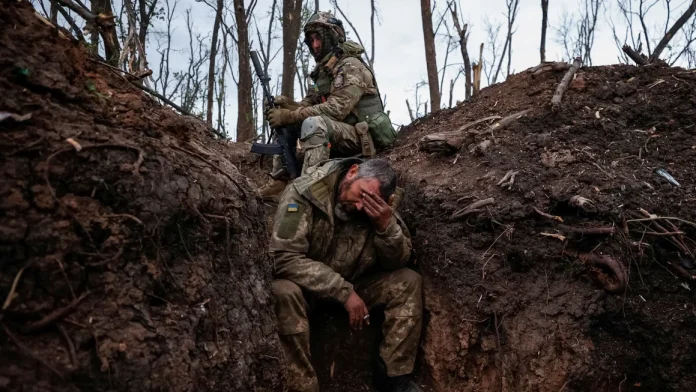US Defence Secretary Lloyd Austin warned on Tuesday that Ukraine’s survival was at risk and sought to reassure allies of the US commitment to Kyiv despite weakening military aid.
The continued arming of Ukrainian soldiers with equipment and supplies is in great doubt as Republican House of Representatives Speaker Mike Johnson keeps refusing to vote on providing Ukraine with another $60 billion, thwarting White House efforts to send much-needed aid to the war-torn country.
According to Reuters, Johnson stated that he would not announce the vote until the Biden administration provided a clear plan for how the allocated funds would be spent, as the war in Ukraine entered its third year, with troops continuing to lose combat positions.
Austin leads a monthly meeting called the Ukraine defence contact group (UDCG) held at Ramstein Air Base in Germany. About 50 allies who support Ukraine attend the meeting.
Today, Ukraine’s survival is in danger and America’s security is at risk. I leave here today fully determined to keep US security assistance and ammunition flowing. And that’s a matter of survival and sovereignty for Ukraine and it’s a matter of honor and security for America.
The Pentagon chief, however, did not share with the conference participants how the US would support Ukraine without approved funding. Defence Ministry officials note that the lack of proper military and financial aid has already resulted in Ukrainian forces fighting in harsh conditions of scarce supplies.
Ukrainian President Volodymyr Zelensky called for more air defence systems on 19 March, arguing that Russia had stepped up its aerial efforts.
Last week, the Biden administration announced it would send $300 million in military aid to Ukraine, but added that it was an extraordinary move after unexpected savings on military contracts negotiated by the Pentagon. However, officials argue that the savings are still not enough to make up for the lack of congressional action.
Helping Ukraine despite its lack of tangible successes in the war is becoming increasingly challenging. European leaders are also beginning to question the ambiguous support of the United States. Rachel Rizzo, a senior fellow at the Atlantic Council’s Europe Centre in Washington, stated:
“It’s becoming harder and harder for US leaders to travel to Europe, with the message that the United States is committed to Ukraine in the long-term. The message of this long-term financial, military, economic commitment flies in the face of the reality of what’s happening on Capitol Hill.”
French President Emmanuel Macron, German Chancellor Olaf Scholz and Polish Prime Minister Donald Tusk reiterated their support for Ukraine at a joint press conference in Berlin. However, the leaders’ stance remains divided as Macron calls for sending troops to Ukraine, putting the entire alliance at risk, while Scholz refuses to supply Taurus cruise missiles for fear of dragging Germany into a military conflict.
German Defence Minister Boris Pistorius announced a 500-million-euro aid package to Ukraine on Tuesday, including 10,000 rounds of ammunition. He also declared that the US remained a reliable partner.
I have no doubt about the reliability of the American. There are particularities in the political systems, and we have to deal with that.
European support is gaining in importance as Biden cannot guarantee a large aid package due to Congressional stance, whereas some of the alliances’ foreign policy efforts are also focused on the Israel-Hamas war in Gaza. The Middle East conflict is creating obstacles to aiding Kyiv as well, as it risks turning into a large-scale regional war, jeopardising not only the already suffering shipping industry.
US Defence Department officials argue that sole European support for Ukraine will not be enough. Therefore, if leaders fail to reach consensus on aiding Kyiv, it is likely that the conflict will result in a loss for the war-torn country.
